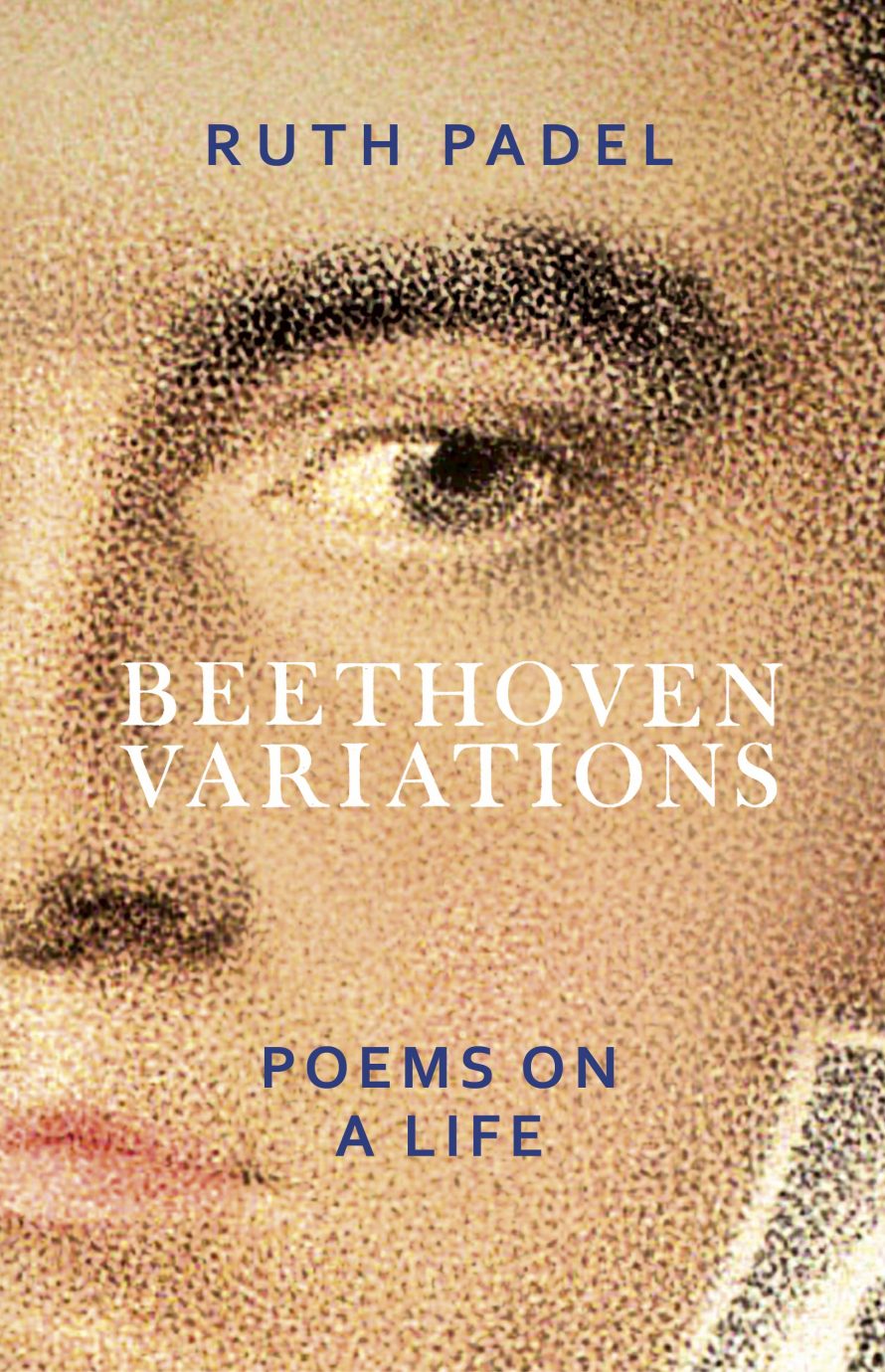Beethoven, Artist of Hope
“As fine a distillation of Beethoven’s biography as can be imagined: beautifully written, factual but elegant, touching, and funny too. Padel includes a list of selected musical works and it could serve perfectly for anyone wanting to listen to Beethoven’s most enduring pieces and to encounter, as she puts it in a poem, ‘the unquenchable spirit / that powers every note he wrote.’” – The Hudson Review
My Beethoven book of poems on his life, with a prose coda at the end like a mini-bio, comes in three editions: a UK edition, an American edition and an Italian edition, Variazioni Beethoven, translated by Paola Splendore.
“Ruth Padel tells the great composer’s life story more profoundly than most biographies. Her imagery and imagination took me deeper into Beethoven than many I’ve read.Her poems are informed by her lifelong immersion in music, starting from her youth, when her father conscripted her into a family ensemble on the viola.She helpfully includes “Life-Notes: A Coda,” 30 pages of short biographical bits linked the poems Even these entries have poetic elegance.” – New York Times
His life was a lonely mess, he longed for love but never married, yet every piece Beethoven wrote, including the ‘Ode to Joy,’ ends on a note of hope.
I recorded these poems (with relevant links to his music) from my biography-cum-poetry collection Beethoven Variations in March 2020. first month of lockdown, when hope was what the whole world needed.
‘Moonlight Sonata’
Beethoven wrote the Moonlight Sonata, here played by Claudio Arrau, when he was going deaf. It starts calm, but the 3rd Movement, Presto Agitato, is full of rage.
For the Eroica / Prometheus Variations, here played by Asita Korepanova, Beethoven borrowed a theme of his Prometheus ballet, about the hero who stole fire from the gods.
Beethoven dedicated the Eroica Symphony, here played by the Berlin Philharmonic Orchestra conducted by Bernard Haitink, to Napoleon, whom he idealised as a man of the people – until Napoleon became Emperor of France and he scratched out Napoleon’s name.
Beethoven took the manuscripts of the Appassionata Sonata (here played by Daniel Barenboem) and string quartets Opus 59 (here is Number 1 played by the Juilliard Quartet, and 2 played by the Castalian Quartet) to stay with his princely patron. Then they had a huge row and Beethoven rushed back to Vienna in a storm. You can see the water-stains on the manuscripts.
– or Für Elise’. Beethoven wrote ‘Für Elise’ for Therese (here played by Lang Lang) but was too drunk to propose. It was found among her things when she died. No one knows why he scribbled on it Für Elise not ‘Für Therese’.
‘The Pencil’
Beethoven found closure from splitting up from the woman he called his immortal beloved when he wroting a song sequence To the Distant Beloved, here sung by Dietrich Fischer-Diskau accompanied by Gerald Moore.
‘Forever Yours, Forever Mine, Forever Us’
After saying goodbye to his immortal beloved, Beethoven wrote three short pieces for All Souls Night, ‘Three Equali for Four trombones,’ here played by the Philip Jones Brass Ensemble. They also played at his funeral, and seem to sum up the funeral of all his hopes for love.
Having losing his great love, Beethoven went through years of writer’s block. His opera was performed successfully for the first time (here is James King, singing the hero in prison, longing for his wife) but otherwise he was alone, reading Hindu mystics and the Sanskrit play Shakuntala, whose heroine searches for a husband cursed to forget her.
When Beethoven recovered from illness aged 55 he called the wonderful slow movement of string quartet Opus 132, a Thanksgiving to the Deity for Recovery, in The Lydian Mode (which was associated with healing). The slow movement ais played here by the Alban Berg Quartet. The full quartet here, by the Ariel Quartet.
‘A Flute of Lilac Wood’
Beethoven left Vienna for the country hoping to ‘rest his ears; and cure his deafness. While there, he composed the ‘Tempest’ Piano Sonata, here played by Daniel Barenboim, full of violent swings between calm and anguish as he realised he his deafness was never going to get better.
‘The Boy on Dragon Rock’
When Beethoven was a teenager in Bonn, he climbed the Dragon Rock above the River Rhine and longed to go east to Vienna. When he got there, one of the first compositions that made him famous was his song Adelaida, here sung by Dietrich Fischer-Diskau.
‘To the Distant Beloved’
Beethoven lost his last love, his ‘Immortal Beloved’, and went through four years of misery and writer’s block until he found closure by writing a song cycle of farewell – the first song cycle in music history, here sung by Dietrich Fischer-Diskau.
‘Musica Humana’
Beethoven died raising his fist in a snowstorm. He had gone through six months of fear, disappointment and illness and pain, but right to the end even his most poignant music ended in hope and joy. His last quartet Opus 135 (here played by Benjamin Bowman, Michael Gurevich, Steven Dann and Franz Ortner) asks ‘Muss es sein?’ (‘Must it be?’) and ends with triumphant acceptance, ‘It must be!’ He told a friend this was a joke. But it could also be his acceptance of life – and death.


